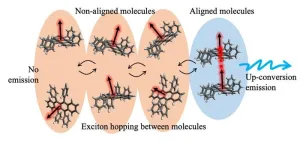(Press-News.org) Research Highlights:
In a review of data for more than 90,000 veterans hospitalized with stroke, African American veterans who had been previously diagnosed with post-traumatic stress disorder (PTSD) were significantly more likely to be re-hospitalized than African American veterans without PTSD.
In contrast, white veterans with PTSD were not significantly more likely to be re-hospitalized after stroke than white veterans without PTSD.
Illicit drug use and Type 2 diabetes also raised the hospital readmission risk in African American veterans but not in white veterans.
The results highlight the need to focus on high-risk groups and control modifiable risk factors to reduce the need for hospital readmission after stroke.
Embargoed until 4 a.m. CT/5 a.m. ET, Thursday, March 14, 2024
DALLAS, March 14, 2024 — After a stroke, African American veterans previously diagnosed with post-traumatic stress disorder (PTSD) were significantly more likely to be re-hospitalized than those without PTSD. PTSD did not raise the risk of post-stroke readmission in white veterans, according to research published today in Stroke, the peer-reviewed scientific journal of the American Stroke Association, a division of the American Heart Association.
“Our findings highlight the important things we can do to improve post-stroke care, such as focusing on high-risk populations, reducing modifiable risk factors, achieving stricter Type 2 diabetes control and access for veterans who may need prescription medication treatment,” said Chen Lin, M.D., M.B.A., senior author of the study, a staff neurologist at the Birmingham Veterans Administration (VA) Medical Center, and an associate professor of neurology at the University of Alabama at Birmingham.
PTSD is a mental health disorder that develops in some people who have experienced or witnessed a shocking, scary or dangerous event and leads to intense anxiety, flashbacks or other symptoms whenever events or situations trigger memories of the original trauma.
Previous studies have shown that people with PTSD have a higher risk of heart disease and stroke and they also develop stroke at younger ages than the general population. And while there have been other studies showing a higher risk of rehospitalization after stroke among Black adults this is the first study to analyze how PTSD affects outcomes after stroke, particularly the need for re-hospitalization.
“In those with PTSD, there are worse outcomes in general among African American veterans than white veterans. We looked at veterans with PTSD after they had a stroke. The main goal was to determine whether those with PTSD and stroke have different risks for stroke recurrence or hospital readmission, and also to see whether race affected readmission rates,” Lin said.
Using a Veterans Health Administration database, researchers analyzed African American and white veterans with stroke, comparing readmission rates in those with and without a PTSD diagnosis. Among the findings:
African American veterans with PTSD had a 10% greater risk of readmission, which was considered significant compared to those without PTSD.
White veterans with PTSD had a 5% greater risk of readmission than those without PTSD, which was not statistically significant.
Type 2 diabetes or illicit drug use was significantly associated with a higher risk of re-hospitalization after stroke among African American veterans, while the same risk factors were not significantly associated with risk of re-hospitalization among white veterans.
Congestive heart failure or high cholesterol were significantly associated with higher risk of re-hospitalization after stroke among white veterans, while these same risk factors were not significantly associated with re-hospitalization among African American veterans.
High blood pressure, a previous heart attack and narrowing of arteries outside of the heart were risk factors that increased the risk of post-stroke readmission in both African American and white veterans.
“We were expecting to see PTSD playing a role in all veterans, so we were surprised at the difference between African American and white veterans in both the impact of PTSD and other risk factors,” Lin said.
“In both the African American and white populations, there are important health conditions that can play a role in the risk of readmission after a stroke. Post-discharge care after stroke is always a challenge — people find it hard to get to the clinic, especially if they have disabilities limiting their walking and driving ability. However, there is certainly a role for more targeted care focused on the modifiable risk factors, such as Type 2 diabetes and illicit drug use,” Lin said.
Study details:
Researchers analyzed previous national data for 93,651 veterans (average age of 68.8 years; 97% male; 22.4% African American adults; 62.9% were white adults) hospitalized at any VA medical center in the U.S. for a first stroke of any type between 1999 and August 2022.
Of those, 18% were readmitted to a VA hospital during an average follow-up period of 5 years.
Almost 14% of stroke patients were also diagnosed with PTSD.
Researchers considered several risk factors to better understand the hospital readmission data, including the presence of congestive heart failure, high blood pressure, high cholesterol, narrowing of the arteries outside of the heart, Type 2 diabetes, illicit drug or alcohol abuse, previous heart attack or a history of smoking.
The study is limited because it reviewed an administrative database of the Veterans Administration, so the findings may not be generalizable to civilians who may have PTSD for different reasons. The results may not be generalizable to female, Asian American or Native American veterans, who made up a very small percentage of the dataset of veterans with stroke in this study.
Co-authors, disclosures and funding sources are listed in the manuscript.
Studies published in the American Heart Association’s scientific journals are peer-reviewed. The statements and conclusions in each manuscript are solely those of the study authors and do not necessarily reflect the Association’s policy or position. The Association makes no representation or guarantee as to their accuracy or reliability. The Association receives funding primarily from individuals; foundations and corporations (including pharmaceutical, device manufacturers and other companies) also make donations and fund specific Association programs and events. The Association has strict policies to prevent these relationships from influencing the science content. Revenues from pharmaceutical and biotech companies, device manufacturers and health insurance providers and the Association’s overall financial information are available here.
Additional Resources:
Multimedia is available on the right column of release link https://newsroom.heart.org/news/african-american-veterans-with-ptsd-had-higher-risk-of-re-hospitalization-after-stroke?preview=cc6a1b1d286340223e5b2bc5ed46f1ca
After March 14, view the manuscript online.
AHA news release: New program for veterans with high cholesterol, associated cardiovascular disease (March 2023)
AHA news release: Research highlights the need to looker closer at CVD risk factors in military veterans (Nov. 2021)
AHA health information: Preventing another Stroke
Follow AHA/ASA news on Twitter @HeartNews
Follow news from the Stroke journal @StrokeAHA_ASA
###
About the American Stroke Association
The American Heart Association is a relentless force for a world of longer, healthier lives. We are dedicated to ensuring equitable health in all communities. Through collaboration with numerous organizations, and powered by millions of volunteers, we fund innovative research, advocate for the public’s health and share lifesaving resources. The Dallas-based organization has been a leading source of health information for a century. During 2024 - our Centennial year - we celebrate our rich 100-year history and accomplishments. As we forge ahead into our second century of bold discovery and impact, our vision is to advance health and hope for everyone, everywhere. Connect with us on heart.org, Facebook, X or by calling 1-800-AHA-USA1.
END
African American veterans with PTSD had higher risk of re-hospitalization after stroke
Compared to African American vets without posttraumatic stress disorder, those with the disorder faced higher odds of returning to the hospital; this was not found among white vets, according to a new study in the journal Stroke
2024-03-14
ELSE PRESS RELEASES FROM THIS DATE:
Researchers can reveal illegal timber exports
2024-03-14
A new method of timber analysis developed by researchers from the University of Gothenburg can confidently identify the location in which the tree was harvested. The method has been developed with the aim of combating illegal timber imports from Russia and Belarus.
Illegal logging and the associated trade in wood products is a global problem that threatens some of the world's most important ecosystems. Researchers are trying to combat this practise with a new scientific method that can reveal ...
Study shows potential for using AI tools to detect healthcare-associated infections
2024-03-14
Arlington, Va. — March 14, 2024 — A new proof-of-concept study published today in the American Journal of Infection Control (AJIC) reports that artificial intelligence (AI) technologies can accurately identify cases of healthcare-associated infections (HAI) even in complex clinical scenarios. The study, which highlights the need for clear and consistent language when using AI tools for this purpose, illustrates the potential for incorporating AI technology as a cost-effective component of routine infection surveillance programs.
According to the most recent HAI Hospital ...
ESHRE launches factsheets to highlight environmental threats to fertility and reproductive health
2024-03-14
Governments must act now to address the effects of climate change and air pollution on fertility rates and reproductive health, says a document published by the European Society of Human Reproduction and Embryology (ESHRE) today (Thursday).
The factsheets* provide comprehensive information on global warming, evidence of its impact on fertility, and calls on policymakers to promote swift prevention measures.
Priorities should be to reach net zero CO2 emissions within the next 20 years, and to keep global warming within a 1.5% increase, says the expert ...
Olympic tower construction at Teahupo’o, Tahiti could damage reef ecosystem
2024-03-14
In preparation for the 2024 Olympic surfing competition, a new judging tower is being constructed in the reef lagoon at Teahupo’o, Tahiti. Researchers from the University of Hawai‘i (UH) at Mānoa, UH Hilo, and Arizona State University and community partners in Tahiti recently published a study in Remote Sensing that assessed the potential impacts of the tower and emphasized the importance of protecting the valuable reef—both as an integral part of the ecosystem and a resource for the local community.
“We ...
UNH ingenuity offers unique way to track carbon emissions in bodies of water
2024-03-14
DURHAM, N.H. — Carbon dioxide (CO2) emissions are not typically associated with water ways, like streams and rivers, but emerging research shows that water bodies play an important role in storing and releasing carbon dioxide. As many states look for cost-effective ways to mitigate climate change, scientists at the New Hampshire Agricultural Experiment Station at the University of New Hampshire looked at a way to optimize CO2 sensors to better measure carbon dioxide emissions in lotic, or moving, bodies of water offering a new tool that can help provide valuable information for everything from land use to climate action plans.
“These sensors, adapted for highly ...
Blast-related concussions linked to higher Alzheimer’s risk
2024-03-14
U.S. veterans of the wars in Afghanistan and Iraq who suffered mild traumatic brain injury from exposure to explosive blasts were found to have changes in cerebrospinal fluid proteins that are typically seen in people who develop Alzheimer’s disease, according to researchers at the University of Washington School of Medicine and VA Puget Sound Health Care System.
“While our research does not prove that veterans who experienced these injuries will develop Alzheimer’s disease, it raises the possibility that ...
Modest rise in UK cancer cases but substantial decline in deaths over last 25 years
2024-03-14
Cases of cancer among UK men and women aged 35-69 years have seen a modest rise over the last quarter of a century, but there has also been a substantial decline in death rates, finds a study published by The BMJ today.
The results show a fall in death rates for all cancers combined and for 17 out of 22 cancer types examined, which the researchers say is likely due to fewer people smoking, screening programmes, and improved treatment, while a rise in some less common cancers may be due to higher levels of overweight and obesity, ...
Cancer deaths plummet in middle-aged people
2024-03-14
A first of its kind study by Cancer Research UK reveals premature cancer death rates in 35–69-year-olds fell by more than a third over 25 years
Improvements in the UK are a result of smokefree policies, prevention measures, early detection programmes like cancer screening, and more effective treatment options
But the study paints a mixed picture with cancer cases on the rise and cancer mortality rates still too high
The charity’s manifesto, ‘Longer, ...
How to upcycle low-energy light
2024-03-14
To combine two low-energy photons into one high-energy photon efficiently, the energy must be able to hop freely, but not too quickly, between randomly oriented molecules of a solid. This Kobe University discovery provides a much-needed design guideline for developing materials for more efficient PV cells, displays, or even anti-cancer therapies.
Light of different colors has different energies and is therefore useful for very different things. For the development of more efficient PV cells, OLED displays, or anti-cancer therapies it is desirable to be able to upcycle two low-energy photons into a high-energy photon, ...
Lives could be saved from tropical disease with new rapid test
2024-03-14
Globally, more than half of patients die after infection with the neglected tropical disease, melioidosis, often before they are diagnosed1. A new rapid test could save lives by diagnosing patients in hours, rather than several days taken by current bacterial culture methods, meaning they receive the correct antibiotics faster.
The test uses CRISPR to detect a genetic target that is specific to Burkholderia pseudomallei, the bacterium that causes melioidosis, with 93 per cent sensitivity. It was ...
LAST 30 PRESS RELEASES:
Alkali cation effects in electrochemical carbon dioxide reduction
Test platforms for charging wireless cars now fit on a bench
$3 million NIH grant funds national study of Medicare Advantage’s benefit expansion into social supports
Amplified Sciences achieves CAP accreditation for cutting-edge diagnostic lab
Fred Hutch announces 12 recipients of the annual Harold M. Weintraub Graduate Student Award
Native forest litter helps rebuild soil life in post-mining landscapes
Mountain soils in arid regions may emit more greenhouse gas as climate shifts, new study finds
Pairing biochar with other soil amendments could unlock stronger gains in soil health
Why do we get a skip in our step when we’re happy? Thank dopamine
UC Irvine scientists uncover cellular mechanism behind muscle repair
Platform to map living brain noninvasively takes next big step
Stress-testing the Cascadia Subduction Zone reveals variability that could impact how earthquakes spread
We may be underestimating the true carbon cost of northern wildfires
Blood test predicts which bladder cancer patients may safely skip surgery
Kennesaw State's Vijay Anand honored as National Academy of Inventors Senior Member
Recovery from whaling reveals the role of age in Humpback reproduction
Can the canny tick help prevent disease like MS and cancer?
Newcomer children show lower rates of emergency department use for non‑urgent conditions, study finds
Cognitive and neuropsychiatric function in former American football players
From trash to climate tech: rubber gloves find new life as carbon capturers materials
A step towards needed treatments for hantaviruses in new molecular map
Boys are more motivated, while girls are more compassionate?
Study identifies opposing roles for IL6 and IL6R in long-term mortality
AI accurately spots medical disorder from privacy-conscious hand images
Transient Pauli blocking for broadband ultrafast optical switching
Political polarization can spur CO2 emissions, stymie climate action
Researchers develop new strategy for improving inverted perovskite solar cells
Yes! The role of YAP and CTGF as potential therapeutic targets for preventing severe liver disease
Pancreatic cancer may begin hiding from the immune system earlier than we thought
Robotic wing inspired by nature delivers leap in underwater stability
[Press-News.org] African American veterans with PTSD had higher risk of re-hospitalization after strokeCompared to African American vets without posttraumatic stress disorder, those with the disorder faced higher odds of returning to the hospital; this was not found among white vets, according to a new study in the journal Stroke



